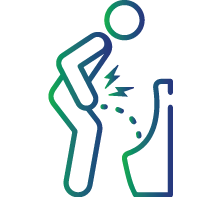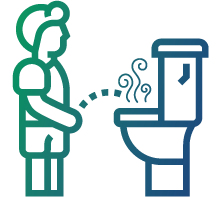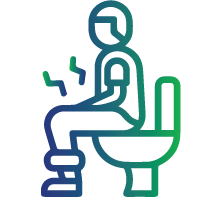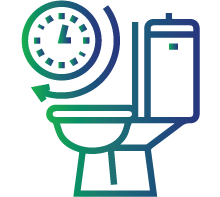
Calcium, 24 Hours Urine
Calcium, 24 Hours Urine
A calcium, 24 hours urine test evaluates the level of calcium in your urine. Calcium is one of the most essential nutrients, which is important for healthy bones and teeth. Low or high levels of blood calcium in your body could be an indication of several diseases including kidney disease, thyroid disease, bone disease, and other conditions. Healthcare providers use this test to screen the level of calcium in your urine and detect any disease.
Inadequate levels of calcium may lead to abnormal bone development, bone weakness, and pain. Excess levels of calcium can cause nausea and vomiting, and frequent urination, which might progress to bone pain and kidney problems. Thus, getting your calcium, 24 hours urine test is recommended to prevent bone-related diseases and kidney stone formation.
Calcium, 24 Hours Urine test is also known as:
Urinary Ca+2, Kidney stones - calcium in urine, Renal calculi - calcium in your urine, Parathyroid - calcium in urine, urinalysis (calcium)
Symptoms of Kidney Stones

Lower back or abdominal pain

Nausea and vomiting

Blood in urine (hematuria)

Frequent urge to urinate

Painful urination (dysuria)

Cloudy or bad-smelling urine
Symptoms Of High Levels Of Parathyroid Hormone

Muscle weakness

Fatigue

Depression

Bone and joint pain

Loss of appetite

Nausea and vomiting

Constipation

Confusion

Increased thirst

Frequent urination
Symptoms Of Low Levels Of Parathyroid Hormone

Abdominal pain

Muscle cramps

Tingling fingers and toes
What Is a Calcium, 24 Hours Urine Test Used For?
Calcium in urine test is used to determine:

Kidney diseases like stone formation

Diseases of thyroid

Parathyroid disease

Malnutrition

Intestinal diseases (which affect calcium absorption)

Certain types of cancers

Bone diseases

Neurological disorders
Test preparation
No special preparation is required for this test. Before the test, you might be asked to avoid a few foods and medications for a few days. Never discontinue taking any medication without first consulting your doctor. If you need to follow any special instructions, your healthcare provider will inform you
Interpretation of the Test Results
For a person eating a normal diet, the expected amount of calcium in the urine is 100-300 mg/day. For those on a diet low in calcium, the amount of calcium in the urine will be 50-150 mg/day.
Deviations from normal levels indicate the following:
A. Increased levels of urine calcium may indicate:
· Milk-alkali syndrome
· Renal failure
· Sarcoidosis
· Hyperparathyroidism
· Vitamin D intoxication
· Renal tubular acidosis
· Use of loop diuretics
B. Decreased levels of urine calcium may indicate:
· Vitamin D deficiency
· Hypoparathyroidism
· Malabsorption (inadequate absorption of nutrients from the intestinal tract) disorders
· Use of thiazide diuretics
FAQs
How is the sample collected for calcium, 24 hours urine test?
In order to provide a urine sample for this test, you will need to collect all of your urine over a 24-hour period. Begin by emptying your bladder fully in the morning without collecting it. Remember to take note of the time. From then on, collect your urine each time you use the bathroom throughout the day. To complete the 24-hour collection, urinate into the container on the morning of the next day and make sure to note the precise time
Are there any risks associated with calcium, 24 hours urine test?
No, there are no risks associated with calcium, 24 hours urine test. It is relatively safe to undergo
Are there any drugs that can interfere with the test results?
Some drugs may increase urine calcium levels, including anticonvulsants, antacids, loop diuretics, and carbonic anhydrase inhibitor diuretics. Some drugs lower urine calcium levels such as adrenocorticosteroids, thiazide diuretics, and oral contraceptives
What is the most common mistake in the calcium, 24 hours urine test?
Failing to collect even some of your urine during the 24-hour collection period or collecting too much urine by going beyond the window period of 24 hours are some of the possible mistakes that can be committed
What is the first morning urine time while collecting calcium, 24 hours urine?
The first morning urine time is the urine that you void right after waking up from sleep. If you wake up during the night, it is not necessary to collect that urine. Instead, you can wait until you get up for the day

